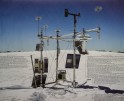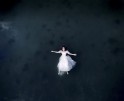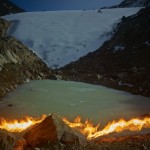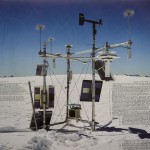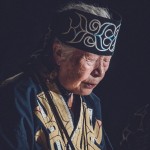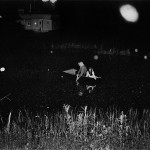Meghan Marin: The Sound of the Sun
Projects featured this week were selected from our call-for-submissions. We will be accepting new projects for review from April 4th-10th, 2021. Today, we are looking at the series The Sound of the Sun by Meghan Marin.
Meghan Marin is a New York based photographer whose work focuses on portraiture and narrative. She graduated in 2019 with a BFA in advertising photography from the Rochester Institute of Technology. Living in Brooklyn, she works with publications such as the New York Times, The Guardian, and Man Repeller. Meghan was raised in Upstate New York and takes heavily from her upbringing in the quiet and solitude of the country. Her work investigating the dualities of small town America and her personal family dynamics, including mother-daughter relationships. She is most interested in finding the curious and exploring the uncomfortable.
The Sound of the Sun
In this work, I explore the complex relationship between me, my younger sister, and my mother. It is woven together with found family images, my mother’s writing, and images from a road trip that the three of us took in May 2019.
My mother has struggled with her mental health for as long as I can remember. This trip was the last time I saw her; shortly after we returned home she had a relapse and was in and out of touch with our family for the past two years. While making this work, I kept searching for clues in her behavior, an indicator of the days to come.
I’m searching for her, us, constantly in every memory. As I pieced together the images I took of the two of them on our trip, I remember the good days, the banality of the long drive, the long conversations. The roadtrip is a gaze into our everyday life as mother and daughters. These images are an attempt to fill the gaps she left in our life, and to reconcile the version of our mother that I remember with the stranger she became.
Daniel George: You write that your mother’s mental health condition has been ever-present in your memory. What motivated you to create a project with these things in mind?
Meghan Marin: My mother is a strong person. She is strong willed, and has lived through much loss. When she is at her best, she is brilliant. The work was a product of my state at the time. Our relationship has always been hot and cold, and my work often circles back to her- she is a driving force of motivation and inspiration.
DG: Was the decision to make and share this work difficult, with it being so personal in nature?
MM: It was. For a while I toyed with the idea of not showing them together, letting them live as loose images unrelated to a story. I knew my family was still hurting from losing her, and I feared it would rub salt in the wound. I didn’t have much of another way to work through my loss, and so I did it anyway. Editing this work also gave me time to reflect on the ways in which I loved her and was angry with her, and to process what had happened.
DG: This series is reminiscent of a family album, and I am fascinated by the interplay of old/new imagery and handwritten text. Why did you select this format, and why did you feel it was important to incorporate these particular found items?
MM: As I was looking through the work I made on our trip, I had a gnawing, selfish need to reconstruct my memory of those few months into a precious keepsake- to preserve my memory of those two good weeks. When I make my work, I often post-rationalize by finding common threads in what I’ve shot. I did this with my work on the road and incorporating our family photos.
A few months after we had lost contact, I visited home to find a box that she had sent with some seemingly random books, notebooks, and objects that were addressed to my sister and I. Some of the images of my mom and her family are ones she sent in that box, and some are images that I took from a scrapbook she made me years ago. These pictures are the way I picture her, not so much in the way that I last saw her. When I made this work, I was in the process of moving my whole life to move to New York after graduating school, and was grasping at straws to root myself in something familiar. Some words of hers are the scans included in the work. I don’t know who they are addressed to, but I think they were meant for me. The family pictures + her writing are tiny pieces of evidence to show me what she was thinking, who she was then.
DG: Several of your photographs depict your mother and/or sister. Other times you point your camera away—into the landscape, toward some feature, or even at other groups of people. Could you talk more about your choice to show these things?
MM: I love photographing my sister, and my mom is a less willing subject. The people around us were just a part of these memories together. There is humor in documenting others’ sightseeing, they do the same things we did on our trip. They consider their surroundings, take snapshots, point to the landscape around them, corral their children. I see our family in these people.
DG: The premise of the family road trip was one of the things that drew me to your work. Memory-making is seemingly inherent in the act of traveling long-distances by car, sight-seeing along the way. And you mention that these experiences have gone on to provide solace in the wake of your mother’s deteriorating mental health. How do you feel these help “fill in the gaps?”
MM: I’m grateful that we got to take the trip together, it was the last time for a while that I spoke to her. Many of the places we visited are places that my parents used to tell us stories about. Wee drove out of our way to visit Devil’s Tower in Wyoming, where she and my dad spent a summer as park rangers. For me, that was our most special day. I saw her again in the way I remember her when I was little.
The photos I took are good memories, and each image in this work reminds me of the love I have for her. On some days, when I catch myself harboring anger against a person who was suffering from mental health issues, they help ground me and realize the root of that pain. I am alright. My sister is alright. My mother will be alright. They continue to give me hope that I can have that love and trust with her again.
Posts on Lenscratch may not be reproduced without the permission of the Lenscratch staff and the photographer.
Recommended
-
Earth Week: Simon Norfolk: When I am Laid in EarthApril 27th, 2024
-
Earth Week: Richard Lloyd Lewis: Abiogenesis, My Home, Our HomeApril 23rd, 2024
-
Earth Week: Ian van Coller: Naturalists of the Long NowApril 22nd, 2024
-
ALEXIS MARTINO: The Collapsing Panorama April 4th, 2024
-
The International Women in Photo Association Awards: Lorraine Turci: The Resilience of the CrowMarch 16th, 2024






























